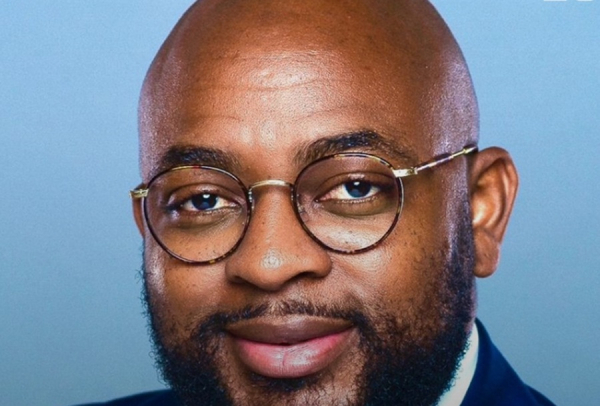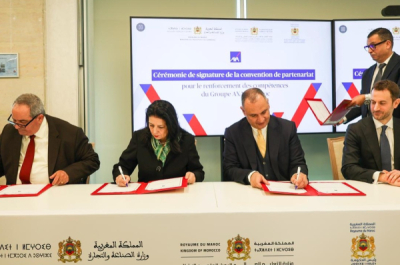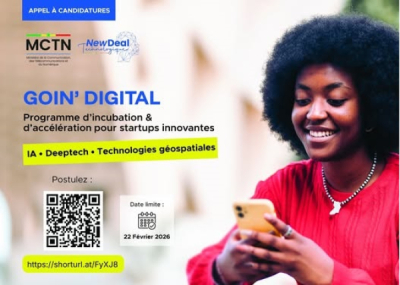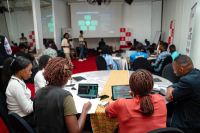- Hol Mayissa co-founded KeeCash in 2018 to provide digital payment solutions without relying on traditional banks.
- The platform offers online accounts and virtual cards funded via Mobile Money or cryptocurrencies.
- KeeCash targets African users seeking easier access to international online payments.
Hol Mayissa, a Gabonese IT specialist and automation engineer, leads KeeCash, a technology company he co-founded in April 2018 with Gilles Moukoumi to simplify and democratize monetary transactions worldwide.
Mayissa said he wants to enable anyone to pay and get paid anywhere without depending on traditional banking systems. He built the technology in response to a concrete need.
KeeCash operates as a fully digital solution dedicated to online payments. The platform primarily targets users in Africa who often face limitations with local payment methods. The service does not operate as a bank, but it provides users with access to an online account and virtual cards that work on most international websites.
The platform offers what it describes as an “international” and “decentralized” account accessible through a mobile application. Users can fund the account at any time through Mobile Money services or cryptocurrencies, which allows them to deposit funds without going through a traditional bank.
The account supports multiple currencies, including euros and U.S. dollars, which simplifies purchases and payments on foreign websites. The user can monitor transactions in real time through a dashboard that centralizes payments and invoices and provides a clear overview of spending. Beyond online payments, KeeCash also enables account-to-account money transfers between users on the platform.
Mayissa earned a degree in electrical engineering and computer science in 2011 from the University Institute of Technology of Saint-Étienne in France. He later graduated from the University of Bordeaux in 2015 with an engineering degree in automation and mechatronics, specializing in automotive, aeronautics and space industries. Between 2015 and 2018, he worked as an automation engineer at Acsystème, a company that supports industrial firms in improving system performance.
This article was initially published in French by Melchior Koba
Adapted in English by Ange J.A de Berry Quenum
- Alric Mintsa founded Mbolojob in January 2024 to connect Gabonese professionals with local and international employers.
- The platform operates as a talent marketplace and targets both domestic candidates and the Gabonese diaspora.
- Mintsa also serves as Head of IT and Digital Strategy at Sopra Steria Consulting in France.
Alric Mintsa, a Gabonese finance and IT professional, founded Mbolojob, an online employment platform designed to connect Gabonese talent with professional opportunities in Gabon and abroad.
Mintsa developed the platform between Paris and Libreville with the aim of enhancing Gabonese career paths and simplifying the link between recruiters and candidates. He said he wants to transform the way Gabonese professionals access job opportunities.
Mintsa launched Mbolojob in January 2024 as a talent marketplace where candidates can create profiles, showcase their skills and attract recruiters. The platform also serves the Gabonese diaspora by facilitating closer ties with the national labor market.
Recruiters from Gabonese companies, as well as foreign firms operating in Gabon or abroad, can access a broad database of profiles. The candidates come “from all over the world,” which allows employers to target both local talent and members of the diaspora.
In parallel, Mintsa holds the position of Head of IT and Digital Strategy at Sopra Steria Consulting, a management and digital transformation consulting firm in France. He also works as a licensed football players’ agent accredited by the International Federation of Association Football (FIFA).
Mintsa graduated from the University of Reims Champagne-Ardenne in 2008 with a master’s degree in signal information and digital communication. He earned a second master’s degree in financial management in 2009 from the Paris School of Business. He began his professional career in 2009 as a business analyst in securities at HSBC Technology Services in France.
Later in 2009, he joined PricewaterhouseCoopers (PwC) as an IT auditor. In 2010, he joined SQLI, a European digital transformation group, where he worked successively as an e-banking consultant, insurance consultant and IT consultant. Between 2016 and 2018, he worked as an IT strategy consultant at DXC Technology, a Paris-based digital services company.
This article was initially published in French by Melchior Koba
Adapted in English by Ange J.A de Berry Quenum
- Morocco signed a partnership agreement with AXA to strengthen national skills in data, artificial intelligence and digital technologies.
- The program supports Morocco’s 2030 digital strategy, which targets training 100,000 young people annually and creating 240,000 tech jobs by 2030.
- Universities and public higher education institutions will collaborate with industry to align training with labor market needs.
The Ministry of Industry and Trade, the Ministry of Higher Education, Scientific Research and Innovation, and the Ministry of Digital Transition and Administrative Reform signed the agreement with the French insurance group AXA on February 16 in Rabat. The agreement aims to enhance national expertise in data, artificial intelligence and digital technologies.
In recent months, Morocco has multiplied partnerships to expand digital skills development. Alongside public stakeholders, technology groups such as Samsung and Mistral AI have supported these efforts to strengthen technical capabilities.
The framework provides for the deployment of initial and continuing training programs, the development of work-study tracks and support for research and development projects linked to digital transformation. The program also aims to anticipate demand for specialized profiles in areas such as cybersecurity, cloud computing, DevOps and software testing while ensuring closer alignment between training supply and labor market needs.
Under the agreement, universities and public higher education institutions will collaborate with schools overseen by the Ministry of Industry and Trade to strengthen links between academia and the private sector. The partnership also provides for internships, professional immersion schemes and programs designed to facilitate the integration of young graduates into technology sectors.
The agreement forms part of Morocco’s national digital transformation strategy through 2030, which positions human capital development as a central lever of economic competitiveness. The roadmap prioritizes digital skills training, the expansion of artificial intelligence and the creation of qualified jobs.
Morocco plans to train 100,000 young people annually in digital skills and to generate 240,000 jobs in the sector by 2030 to meet rising demand for specialized talent.
The Ministry of Digital Transition said the partnership should help structure a national ecosystem capable of anticipating technological shifts and positioning Morocco as a regional hub for technology professions in support of digital sovereignty and economic competitiveness.
This article was initially published in French by Samira Njoya
Adapted in English by Ange J.A de Berry Quenum
Senegal’s Ministry of Communication and Digital Economy is now accepting applications for Goin’ Digital, a program dedicated to startups innovating in AI, deep tech, and geospatial solutions. Selected participants will receive technical and business mentorship, access to high-tech infrastructure, seed grants, and exclusive networking opportunities with partners and investors.
On May 27-28, 2026, the Healthcare Innovation Summit Africa will bring together hospital executives, policymakers, digital specialists, healthcare providers, investors and health-tech startups in Johannesburg. This year’s edition will focus on connected care and smarter health systems, highlighting practical approaches to improving access, efficiency and patient outcomes through digital health and artificial intelligence.
Spiro, a company specializing in rent-to-own electric motorcycles, has secured $7 million in debt financing from Nithio, a US-based climate investor. The funding will accelerate the rollout of electric bikes and the expansion of battery infrastructure, including swapping stations, across several African markets.
- Lemonade Payments, founded in November 2022 by Kenyan entrepreneur Mark Machiri Kihara, offers digital solutions to accelerate and simplify business payments.
- The platform supports all company sizes across sectors including retail, e-commerce, hospitality, travel, marketing, and services, providing both technical and commercial assistance.
- Clients access detailed dashboards to monitor financial flows, payment performance, and customer behavior, enabling data-driven business decisions.
Mark Machiri Kihara co-founded and serves as CEO of Lemonade Payments, launched in November 2022. The company designs digital payment solutions to make transactions faster, simpler, and more secure for African businesses.
Lemonade Payments manages daily inflows and outflows for companies of all sizes. The platform serves multiple sectors, including retail, e-commerce, marketing, hospitality, travel, consulting, and a wide range of service industries. Kihara said the goal is to leverage payments as a growth driver through reliable and rapid transfers.
The company goes beyond transaction processing. Each client receives dedicated support teams for technical integration and commercial follow-up. This assistance streamlines system integration, resolves issues quickly, and optimizes payment workflows.
Lemonade Payments provides clients with detailed dashboards that track financial flows, payment performance, and customer experiences. These analytics help companies identify peak payment times, evaluate payment methods, and make better operational decisions.
Kihara holds a bachelor’s degree in finance from United States International University – Africa, earned in 2009. He began his career in 2012 as a client relationship manager at Standard Chartered Bank and later served from 2022 to 2024 as head of corporate relationships at Co‑operative Bank of Kenya.
This article was initially published in French by Melchior Koba
Adapted in English by Ange J.A de Berry Quenum
- Kenai centralizes visitor, employee and vehicle access management on a single digital platform.
- The company integrates biometric facial recognition, real-time occupancy tracking and compliance reporting aligned with GDPR and POPIA.
- Kenai recently raised an undisclosed amount from Gallagher Security to fund its international expansion.
Kenai operates as a digital solution developed by a South African start-up. The platform unifies reception processes, entry and exit management for visitors, staff and vehicles through a single interface.
The company enables pre-registration, rapid check-in, biometric facial recognition and real-time presence tracking. The system replaces paper forms and manual logbooks that often create errors and delays. The company operates from Johannesburg, and Robert Salzwedel founded the start-up in 2018.
Moreover, the solution captures non-disclosure agreements, consent forms and security checks with time-stamped digital signatures that companies can use for compliance reporting. The platform supports regulatory frameworks such as the General Data Protection Regulation and South Africa’s Protection of Personal Information Act.
Kenai reduces registration processes that traditionally required several minutes to only a few seconds through automation and digital kiosks. Managers monitor site occupancy in real time and access instant reports, which strengthens planning, security oversight and audit readiness.
Recently, the start-up secured an undisclosed funding round from Gallagher Security to support its international growth. “Cet investissement nous permettra d'accélérer notre croissance soutenue et de renforcer notre équipe à mesure que nous nous développons à l'international,” said Robert Salzwedel.
Kenai structures its modules to cover the full management cycle, including visitor management, employee access, perimeter control, resource booking, safety training and evacuation procedures. The platform integrates with existing infrastructure and access control systems already deployed on corporate sites.
Adoni Conrad Quenum
- The Democratic Republic of Congo aims to train 250,000 young people in digital skills under a five-year national program.
- The government signed a memorandum of understanding with Cisco and Cybastion in September 2025 to implement the initiative.
- Authorities target digital skills as a response to youth unemployment, as young people represent more than 50% of the working-age population.
The government of the Democratic Republic of Congo announced on Monday, February 16, the completion of the first phase of trainer training in Kinshasa under a national digital upskilling program that ultimately targets 250,000 young Congolese. Authorities will now extend the project rollout to the provinces.
On February 13, 2026, the Ministry of Youth and Civic Education detailed the program framework. Five hundred young participants began a hybrid training pathway, and organizers will use a final test to select 200 top-performing candidates. Program managers will assign selected participants to three levels—Basic, Intermediate and Advanced—and will deploy them nationwide as skills multipliers.
In September 2025, the Congolese government signed a memorandum of understanding with Cisco and Cybastion to implement the program over five years. The curriculum will provide training in networking and cybersecurity, data science, programming and operating systems, technical English, digital transformation and entrepreneurship.
The ministry stated that, beyond training, “Cisco and Cybastion will support the professional integration of young people through their network of local partners, thereby creating real employment and entrepreneurship opportunities.”
The completion of the trainer training phase marks the effective launch of the broader youth training program in digital professions. Authorities view digital technology as a key driver of economic and social development and as a vehicle for job creation and youth empowerment, particularly as employment concerns persist in the country.
A 2022 study by the Ministry of Planning showed that individuals aged 15 to 29 account for 50.44% of the working-age population. The study reported a youth unemployment rate of 2.5%, compared with 1.4% for adults, and it showed that long-term unemployment affects 61.8% of young people versus 61.2% of adults. The study estimated that the country will need to create about 9.6 million jobs between 2022 and 2030 to stabilize unemployment and labor force participation rates, and nearly 35 million jobs by 2050.
Isaac K. Kassouwi
- Three start-ups from Jordan, Madagascar and Tunisia won the 2025 international final held in Casablanca on February 4.
- Orange awarded a total of 50,000 euros and support through its Orange Digital Centers network.
- The 2025 edition trained 369 young innovators from 14 countries, and 56 Startup4Good projects emerged.
The international Orange Summer Challenge competition, which promotes responsible entrepreneurship in Africa and the Middle East, announced the winners of its third edition during a final held on February 4 in Casablanca, Morocco. The jury recognized three start-ups for their potential impact in occupational safety, sustainable energy and water resource management.
Jordan-based SafeGuard secured first prize with an intelligent workplace accident prevention device that uses risk detection technology. Madagascar-based GasNika ranked second with a biogas production solution that converts organic waste into biological fertilizer. Tunisia-based DripIn completed the podium with a connected solution that uses artificial intelligence to detect water leaks and optimize consumption.
Organizers granted the winners financial, technical and commercial support through the Orange Digital Centers network, and they allocated a total prize of 50,000 euros to accelerate project development.
For the 2025 edition, 369 young innovators from 14 countries completed an intensive support program that combined training, mentoring and coaching. Orange Afrique et Moyen-Orient deployed the program with support from technology and institutional partners, including Amazon Web Services, Meta, the United Nations Development Programme, The Hashgraph Association and Dar Blockchain. The program generated 56 projects under the Startup4Good theme across sectors such as environment, health, education and agriculture.
According to Ben Cheick Haidara, Deputy Chief Executive Officer and Chief Operating Officer of Orange Afrique et Moyen-Orient, the 2025 edition reflects the group’s ambition to position Orange Digital Centers as open innovation platforms focused on social and environmental impact. “Bien plus qu’une compétition, ce programme permet aux jeunes entrepreneurs de développer des solutions technologiques, notamment basées sur l’intelligence artificielle, pour répondre concrètement aux défis sociétaux et environnementaux. À travers les Orange Digital Centers, Orange s’engage durablement aux côtés de la jeunesse pour faire émerger une innovation à fort impact en Afrique et au Moyen-Orient,” he said.
Samira Njoya
More...
- Senegal aligned the Digital Economy Acceleration Project (PAENS) with its national digital transformation agenda for 2026.
- The government increased the Ministry of Digital Affairs’ 2026 budget by 38.7% to CFA81.06 billion ($146 million), with nearly 60% allocated to investment.
- The World Bank committed CFA95.05 billion to support connectivity, digital public services and regulatory reforms.
During the World Bank’s portfolio review in Senegal, the Minister of Communication, Telecommunications and Digital Affairs met on Thursday, February 12 in Dakar with Ousmane Diagana, Vice President of the World Bank for Western and Central Africa, who toured the country with his teams. The meeting allowed officials to present Senegal’s integrated digital vision and to review the main pillars of the New Deal Technologique, the national roadmap for digital transformation.
Officials placed the Digital Economy Acceleration Project in Senegal (PAENS) at the center of discussions. Authorities recently aligned the project with the national agenda after several months of detailed structuring. The updated framework now integrates concrete priorities, including the deployment of an integrated public financial management system, the strengthening of cybersecurity capabilities, the establishment of a sovereign government cloud and the development of artificial intelligence use cases.
Moreover, participants validated operational milestones scheduled for the first half of 2026. Authorities will launch a tender to connect underserved “white zones,” particularly in the groundnut basin and Lower Casamance. Project managers will start construction of the integrated accounting module of the SIGIF public finance system, and health officials will deploy an electronic patient record system financed under PAENS.
Rising Budget Allocation to Support Digital Push
Senegal increased the budget allocation dedicated to digital development to support these objectives. The Ministry of Digital Affairs secured CFA81.06 billion (about $146 million) for 2026, and the government raised the allocation by nearly 38.7% compared with 2025. The ministry allocated nearly 60% of the envelope to investment, particularly in infrastructure, cybersecurity and digital economy development.
All these initiatives align with the New Deal Technologique that Senegalese authorities launched in February 2026 to position digital technology as a driver of sovereignty and development. In this context, PAENS benefits from substantial support from the World Bank, which committed CFA95.05 billion to strengthen the legal, regulatory and institutional framework of the digital economy, expand broadband connectivity, promote digital inclusion and support digital adoption in public services, particularly through digital health.
This article was initially published in French by Samira Njoya
Adapted in English by Ange J.A de Berry Quenum
- Zulu Tech, founded in 2020, delivers customized digital solutions to organizations across sectors.
- The company developed platforms in education, home services, health tech and international money transfers.
- Founder Kena Girma previously worked with Dowell Research UK and several technology firms as a software developer.
Kena Girma works as an Ethiopian software engineer and technology entrepreneur. He founded and leads Zulu Tech, a company that specializes in designing customized digital solutions for organizations.
Zulu Tech, which Girma established in 2020, supports companies in achieving project objectives through disciplined execution and strict adherence to deadlines. The company adapts each solution to specific client requirements and provides website and application design and development services, as well as digital advisory and consulting support.
Moreover, the company maintains project performance after deployment by delivering maintenance and support services that keep applications updated and operational.
Among its deployed solutions, Zulu Tech developed “Zulu Learn,” an artificial intelligence-based learning platform that helps high school students improve academic performance and prepare for national examinations with confidence. The company also created “HandyMan,” an all-in-one service platform that connects users with qualified professionals for home maintenance, repairs and a broad range of on-demand services.
In addition, Zulu Tech launched “HakimHub,” a web and mobile health application that uses advanced language models to transform how users access medical advice. The company also introduced “Hakim Express,” an application that enables users to conduct international money transfers with real-time exchange rates and secure payment processing.
Kena Girma earned a degree in computer science from Addis Ababa University. He joined Dowell Research UK, a London-based research firm, as a mobile application developer. He later worked as a freelance software developer for technology companies including Eskalate, Glamiris and hozma.tech.
This article was initially published in French by Melchior Koba
Adapted in English by Ange J.A de Berry Quenum
- Algeria launches online platform for certified court copies
- Lawyers receive electronically signed documents within 24 hours
- Initiative advances broader judicial digitalization efforts
Algeria's Justice Minister Lotfi Boudjemaa on Sunday announced the launch of a digital platform enabling lawyers to request and retrieve certified copies of court judgments and rulings online. He made the announcement from the Biskra Court on Feb. 15.
The initiative aims to simplify procedures and reduce physical trips to courthouses.
The platform allows lawyers to submit requests for certified copies from both ordinary and administrative courts and retrieve electronically signed documents. Each request is processed automatically and made available within 24 hours. According to the minister, the system modernizes court operations and improves responsiveness for legal professionals and litigants. Access is through each lawyer's electronic account on the Justice Ministry's digital interface for exchanging petitions and briefs.
The initiative is part of a broader push to digitize judicial services in Algeria. Since May 2024, a national electronic portal has allowed case tracking and retrieval of simple copies of judgments and rulings from any court in the country, reducing delays and travel for litigants and their lawyers.
Like Algeria, several African countries have pursued digital modernization of their judicial systems. In Morocco, digital platforms allow lawyers to file documents electronically, track case progress and access certain records such as criminal background checks or court decisions. In Rwanda, the Integrated Electronic Case Management System handles digitization of case filing, case tracking and virtual hearings, making procedures more accessible and transparent for litigants.
Samira Njoya
As site security, regulatory compliance and operational efficiency become top priorities for businesses and institutions, Kenai positions itself as a digital platform for managing visitor and employee access.
Kenai is a digital solution developed by a South African startup. It brings together visitor, staff and vehicle check-ins and site access management on a single interface.
The platform enables pre-registration, rapid check-in, facial recognition and real-time attendance tracking, replacing paper forms and manual registers that are often prone to errors or delays. Based in Johannesburg, the company was launched in 2018 by Robert Salzwedel.
The solution manages non-disclosure agreements (NDAs), consent forms and security checks, using time-stamped digital signatures to generate compliance reports under frameworks such as the General Data Protection Regulation (GDPR) and South Africa’s Protection of Personal Information Act (POPIA).
With Kenai, processes that once took several minutes are reduced to seconds through automation and digital kiosks. Managers can view site occupancy in real time and access instant reports, supporting planning, security and audits.
Recently, the startup secured undisclosed funding from Gallagher Security, a New Zealand company, to support its international expansion. “This investment will allow us to accelerate our already strong growth, and build the team as we expand internationally,” Salzwedel said.
Kenai’s full suite of modules covers the lifecycle of site and access management, including visitors, employees, perimeter access, resource bookings, security training and evacuation procedures. The platform integrates easily with existing infrastructure and access control systems.
Adoni Conrad Quenum















